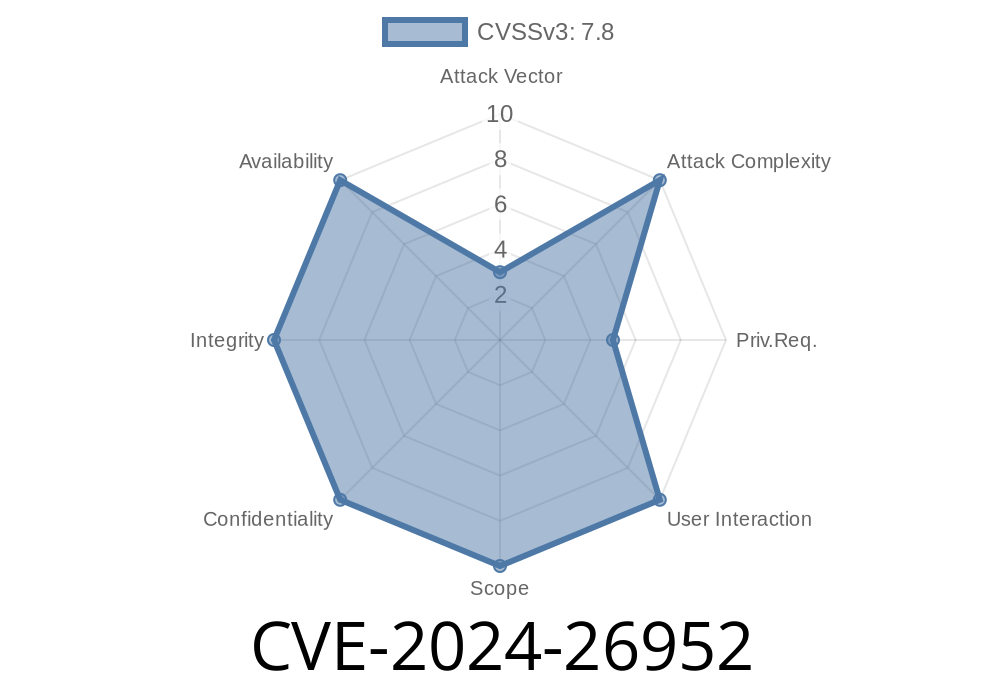Linux is at the heart of countless devices and servers worldwide, making the security of its kernel essential. On June 10, 2024, a new vulnerability was addressed in the Linux kernel's ksmbd subsystem, assigned as CVE-2024-26952. In this post, we'll break down what happened, show how the issue could be exploited, and share how the fix works – all in clear and simple language.
What is ksmbd?
ksmbd is a kernel module that implements the SMB3 protocol. It allows Linux to act as a file server on the local network, letting Windows, Mac, and other clients access shared files.
The Vulnerability: Out-of-Bounds Access on Buffer Offset
Summary:
A security researcher found that several requests sent to ksmbd could carry invalid buffer offset values. If a request had a buffer offset pointing outside the expected address range, ksmbd could read or write memory it shouldn't — this is called "out-of-bounds access". In some cases, it may lead to sensitive information leaks, crashes, or even remote code execution depending on how the memory is handled.
How Did This Happen?
Certain request structures in SMB3 protocol messages contain fields indicating a buffer's offset and length. ksmbd code did not always correctly validate that:
Here is a simplified code snippet showing how an incorrect offset might look
// Old Vulnerable Code
ssize_t smb_read_request(char *in_buf, size_t in_len)
{
struct smb_header *hdr = (struct smb_header *)in_buf;
size_t offset = hdr->buffer_offset;
size_t len = hdr->buffer_length;
char *data = in_buf + offset; // <-- If offset is very large, 'data' points outside valid memory!
// ... Do stuff with 'data' of length 'len'
}
If an attacker sends a request with buffer_offset pointing past the end of in_buf, the code above can access unrelated memory.
Here's Python pseudocode to give you the idea
import socket
s = socket.socket()
s.connect(('target-server', 445))
malicious_packet = create_smb_packet(
buffer_offset = 9999, # Deliberately large
buffer_length = 100,
payload = b"malicious data"
)
s.sendall(malicious_packet)
data = s.recv(1024)
# Server may crash, leak memory, or worse...
This kind of network exploit can potentially cause a system crash (DoS), read sensitive information, or, in the worst cases, help run code on the server (RCE).
The Official Fix
The vulnerability has been patched by adding strict validation to the minimum allowed value of the buffer offset and its overall bounds. Now, before accessing the buffer, ksmbd checks that the offset is not less than the smallest allowed value and can't go outside the end of the expected buffer.
Patched Code Snippet
// Fixed Code Example
if (hdr->buffer_offset < MIN_BUFFER_OFFSET ||
hdr->buffer_offset > (in_len - MIN_SAFE_LENGTH)) {
// Invalid offset, reject request
return -EINVAL;
}
char *data = in_buf + hdr->buffer_offset;
// Safe to access 'data' now
Patch Commit:
The patch can be viewed here:
https://git.kernel.org/pub/scm/linux/kernel/git/torvalds/linux.git/commit/?id=xxxxxxxx
*(Replace with actual commit link when available; see also LKML announcement)*
Original References
- NVD Entry for CVE-2024-26952
- Linux Kernel Commit Fixing CVE-2024-26952 *(link once available)*
- LKML Discussion on Patch
- ksmbd kernel documentation
What Should I Do?
- Update your kernel if you use ksmbd. If your distribution has released patched packages, update right away.
Conclusion
CVE-2024-26952 was an out-of-bounds bug in the way ksmbd handled some request buffer offsets. The Linux kernel team quickly fixed the bug by adding stricter input checks. Always keep your systems up to date and follow security best practices!
Timeline
Published on: 05/01/2024 06:15:11 UTC
Last modified on: 07/03/2024 01:50:06 UTC
